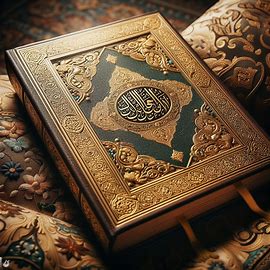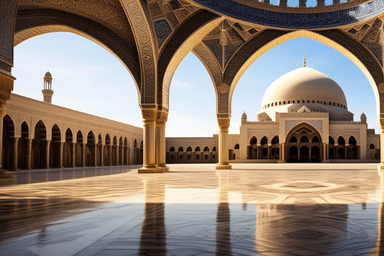Islam is synonymous with submission. The term ‘Islam’ comes from the fact that it is founded on devotion to Allah (God). A Muslim (Muslim, Momin) is someone who devotes his ideas to God and lives in accordance to God.
Islam is the deen (religion) of the entire creation, because the entire creation and all of its components are regulated by God’s rules.
Humans are intended to have the same mindset as this creature. Man should live his life as God’s hope, just as the rest of creation is created entirely obedient to God. The only distinction is that creation is compelled to obey God, whereas man is supposed to willingly obey God’s demands.
When a person accepts Islam, his ideology is subsumed under Islam first. Then all of his wants, feelings, interests, connections, loves, and dislikes are coloured in the colour of obedience to God.
Then one’s daily existence becomes subservient to Allah. His actions and interactions with others are prohibited by Islam. From the inside out, he transforms into a subservient individual.
Allah’s slave is man. In this world, the only path for a human being is to be a servant of Allah. Islam is another word for this subservient behaviour. The Islamic way of life is one of devotion and surrender to God. Un-Islamic behaviour occurs when a person becomes rebellious and haughty, living his life apart from God.
In Islam all belongs to Allah.
In it all endeavours of a Muslim are essentially worship. A Muslim stands in front of his Lord as a bondsman totally dependent on His mercy. The teachings of Islam cover life in totality. Nobody is allowed to introduce any change in them. Even the greatest scholar or Islamic leader of a time has no right to introduce a change in an Islamic injunction if it is explicitly laid down in the Quran as final.
Islam is a religion that holds a prominent place in the lives of over one billion believers worldwide, making it the second-largest religion in the world. Rooted in the teachings of the Prophet Muhammad, Islam emerged in the Arabian Peninsula in the 7th century CE and has since spread across continents. With the rise of globalization and an increasingly interconnected world, understanding Islam is crucial for fostering harmonious relations and promoting tolerance.
At the core of Islamic beliefs lies the concept of monotheism, or the belief in one God, known as Allah. Muslims, the followers of Islam, view Muhammad as the final prophet in a long line of messengers sent to guide humanity towards the path of righteousness. The revelation of the Quran, Islam’s holy book, is considered the pinnacle of Muhammad’s divine communication, guiding Muslims in everyday life and matters of faith.
Islam is a comprehensive way of life that encompasses religious, social, and legal aspects. The Five Pillars of Islam are the foundation upon which this way of life is built. These pillars include the declaration of faith, prayer, charity, fasting during the holy month of Ramadan, and the pilgrimage to Mecca, known as the Hajj. Each of these pillars holds immense significance for Muslims, shaping their daily routines and spiritual connections.
The act of prayer, or Salah, plays a crucial role in the lives of Muslims. It is mandatory for Muslims to pray five times a day, facing the Kaaba in Mecca, Islam’s holiest city. This ritual allows Muslims to maintain a direct connection with God and seek spiritual solace and guidance. Prayer also serves as a means of spiritual purification, allowing Muslims to distance themselves from worldly distractions and seek closeness with the divine.
Charity, or Zakat, is another fundamental pillar of Islam. Muslims believe in giving a portion of their wealth to those in need, thereby fulfilling a social obligation and promoting economic justice. The Quran emphasizes the importance of sharing one’s resources with the less fortunate, highlighting the significance of compassion and empathy in Islamic teachings.
Fasting during the holy month of Ramadan is an essential practice for Muslims worldwide. From dawn until sunset, Muslims abstain from eating and drinking, engaging in rigorous self-discipline and self-reflection. Ramadan is a time of heightened spirituality, where Muslims strive to increase their acts of worship and engage in acts of charity and selflessness. Through this act of fasting, Muslims cultivate a sense of empathy towards the hungry and develop self-control over their desires and impulses.
The Hajj, the annual pilgrimage to the Islamic holy city of Mecca, is a unique experience for Muslims. Performing the Hajj demonstrates a Muslim’s ultimate devotion and submission to Allah. Millions of Muslims from all corners of the globe gather in Mecca to undertake a series of rituals, including circling the Kaaba, praying at the sacred sites of Mina and Arafat, and symbolically stoning the devil. The Hajj serves as a unifying force, bringing together individuals from diverse backgrounds, languages, and races, emphasizing the universality and egalitarian nature of Islam.
Islam, like any religion, has its diversity of interpretations and practices. It is crucial to approach the subject of Islam with an open mind, recognizing that not all Muslims may adhere to the same beliefs or practices. Engaging in dialogue and cultivating interfaith relationships is essential for dispelling misconceptions and promoting peaceful coexistence.
In conclusion, Islam is a religion that holds a significant place in the lives of billions of people worldwide. Understanding the fundamental beliefs and practices of Islam helps foster tolerance, empathy, and respect between individuals of different faiths. The Five Pillars of Islam, including the declaration of faith, prayer, charity, fasting, and the Hajj, provide Muslims with a strong foundation for their spiritual and daily lives. By appreciating the diversity within Islam and engaging in dialogue, we can build bridges of understanding and promote a more harmonious and inclusive society.


